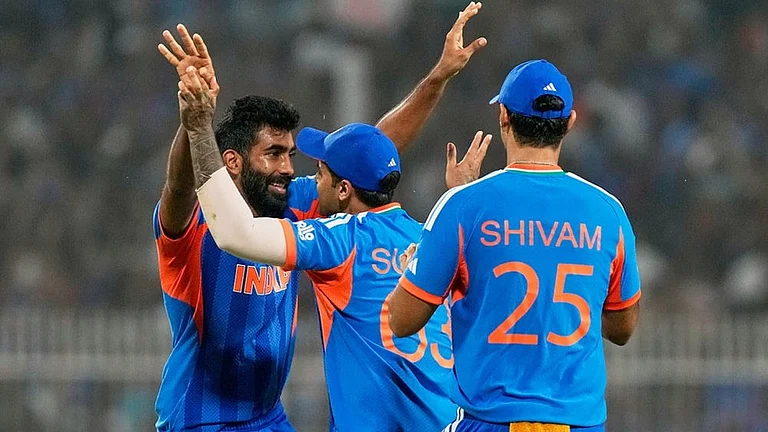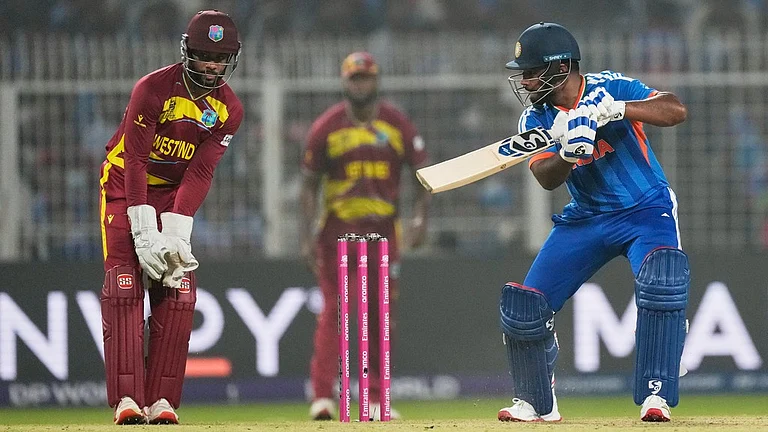In the last week of October, a panel overseeing the development of textbooks in the NCERT, one of 25 such committees, unanimously decided to suggest changing the name “India” to Bharat” in school textbooks. The proposal came against the backdrop of an ongoing debate about renaming the country as ‘Bharat’.
The debate was stoked earlier when the Centre sent G20 dinner invites hosted by President Droupadi Murmu in the name of “President of Bharat”. According to committee chairperson CI Issac, the move is intended to decolonise the Indian education and knowledge system.
“After 75 years, it is time to shed this colonial name and revert to what the nation was originally called. ‘Bharat’ is more representative of India’s past heritage,” Isaac, a Padma Shri, states. The historian has been known for his support of the Modi-led government at the Centre and is an RSS ideologue.
He suggests that up till Class 6, textbooks can carry both “India” and “Bharat” but from Class 7 to Class 12, Bharat should be the only word they read in books. “The teenage years are important,” Isaac says. While the NCERT has not yet given its nod, stating that it’s too premature to react at this point, the move has raised questions about the NCERT’s role in the new nation building project undertaken by the BJP.
One can understand the politics behind it, says academic and Delhi University professor Apoorvanand. He explains how the name change is part of the “so-called decolonisation process by the BJP through which it is trying to tell its constituents that it is giving back to them their original self, which was at some point lost or distorted”. “India” is the distorted self and BJP is restoring the “original Bharat to Bharatwasis,” he explains. “That is the broad political ideology behind not just this proposal but also behind the whole syllabus rationalisation project”.
In June last year, the NCERT completed its controversial syllabus rationalisation process undertaken from December 2021. Since 2014, the NCERT has undertaken three textbook reviews and the latest came ahead of the National Curriculum Framework overhaul. The “rationalisation” led to a row as many, including academics, former advisors and members of textbook development committees and subject experts, objected to the rather irrational deletion of certain key portions from the lessons without consulting the relevant committees. The changes were most glaring in the history and political science textbooks. Historians and academics, including Apoorvanand, Irfan Habib, Mridula Mukherjee, Upinder Singh and Uma Chakrabarti, among others, issued a terse statement against the “selective dropping” of chapters and passages, calling it a matter of “great concern”. The changes were also called “non-academic” and partisan.
Media investigations found that in the new books, content pertaining to Mahatma Gandhi’s assassination was dropped. Key portions and sentences from chapters on Mughal courts, the caste system and the 2002 Gujarat riots were also removed. Many of these deletions did not appear in NCERT’s initial ‘list of rationalised content’ officially released in June 2021.
Anita Rampal, professor and former Dean at Delhi University’s Faculty of Education and former member of NCERT’s Executive Committee, states that the usual process of implementing changes in textbooks happens through academic consultation and there are protocols and a pedagogical method to arrive at it. Rampal, who was also the chairperson of the Advisory Teams for Textbooks at the Primary Stage at NCERT, adds that though several changes have been made in the existing books, neither she nor the advisors responsible for developing the previous textbooks were consulted.
What is the process of inserting changes in NCERT books?
The NCERT under Krishna Kumar initiated a very novel process. It formed 21 focus groups working on several topics. These groups gave recommendations about content and pedagogy. Then there was a larger monitoring group which looked at all the recommendations. Since this committee included the chairpersons of all the focus groups, it took a holistic approach toward the recommendations.
“This was the process that was followed in 2004-05 when we were part of the rationalisation process,” Apoorvanand adds. “But there is no fixed process. It all depends on the current administration of the NCERT, how it plays its role and how it wants to take forward this question. No recommendation made by any committee is binding at all,” he states.
Muzaffar Assadi, Mysore University Dean and former member of the textbook development advisory committee, states that the move to pitch “Bharat” instead of India reeks of a political agenda. “Their whole argument of ‘India’ being a colonial word lacks academic backing,” he states. Centuries before the British came, Greek historian Megasthenes wrote a book called Indika, describing India from 2,300 years ago. Despite some of its wild claims, it remains an important account of Chandragupta Maurya’s empire in India and the first influential work on India by any Western author. He visited India between circa 302 BCE and 288 BCE. A variant of the word “India” was also used by Greek historian Herodotus in his accounts describing the nation.
There are arguments stating that the name India was indeed derived from “Sandhu”, the Sanskrit name for the Indus River. “Then how is India colonial? And why is Bharat the chosen name, why not Hindustan? It’s because Bharat has a distinct religious back story that fits neatly with the new nation building process,” Assadi states.
He was one of the 33 academics and writers who urged the body to remove their names from the textbooks. “They were hell-bent on changing some of the items in the lessons or issues described in the lessons without consultation from various committees or writers. We were not even informed. Their argument is that once you have submitted the manuscript, that becomes the copyright of the institution and they can do with it as they wish,” he states. Assadi, however, believes that changing the name in a textbook will not be enough to obliterate the “idea of India that is part of people’s collective memory and imagination”.
At present, there are 25 committees overseeing textbook development in the NCERT. Issac’s committee, which has seven members, wants to implement the name change as part of the Centre’s 2020 National Education Policy, to be reflected in the next batch of textbooks.
Issac feels that the implementation of the change may take some time yet. “We still have to get through the bureaucracy first,” he states. The NCERT, which has so far remained neutral to the name change suggestion, nevertheless, appears to be in a flux. At a time when “Indian Systems of Medicine”, “Vedic astronomy” and “indigenous knowledge systems” are being preached by the likes of the University Grants Commission (UGC) and other bodies/politicians, will the NCERT remain a neutral source of formative education?
“NCERT books affect children at a formative stage and such changes will go a long way in establishing their national identity. Just like the battle between the so-called ‘India’ and ‘Bharat’, the NCERT today is facing an ideological battle of ideas. Will it choose to be progressive or will it choose an indigenous knowledge system at the cost of logic and science?” Assadi asks. The answer to that would depend on the strength of Parliamentary democracy in India today.
(This appeared in print as ‘A Textbook Case’)


























